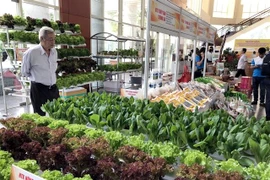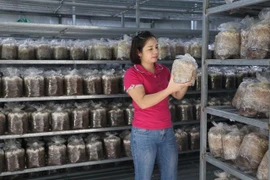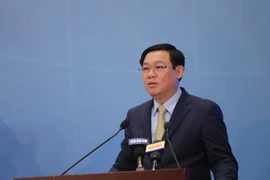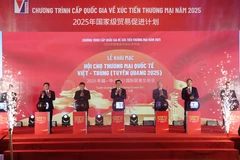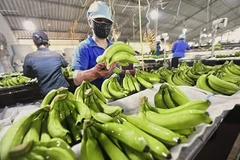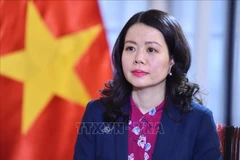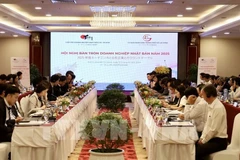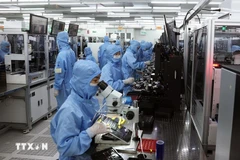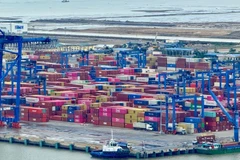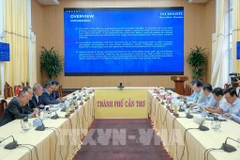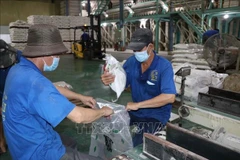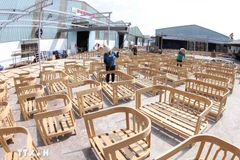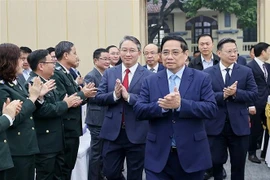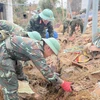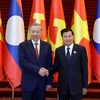 National conference reviewing 15 years of implementing the fifth resolution of Party Central Committee on continuing to renovate, develop and raise efficiency of collective economy. (Photo: VNA)
National conference reviewing 15 years of implementing the fifth resolution of Party Central Committee on continuing to renovate, develop and raise efficiency of collective economy. (Photo: VNA)
Developing the collective economy must follow the market principles. Experiences show that support policies which do not follow these will fail.
At the fifth session of the ninth Party Central Committee, for the first time a specific resolution on the collective economy was issued with the goal of bringing the collective economy out of the current weaknesses for a higher growth pace and an increasing rate in the GDP by 2010.
Over the 15 years of the implementation of the resolution, many positive changes have been seen in the perception on the collective economic development by party and administrative committees. Besides, social psychology also recorded an improvement in eradicating the complex created by the old-style cooperative models.
Role of collective economy affirmed
A very clear outcome in the 2003-22018 period is the number of new cooperatives was brought to 20,841. However, that of those dissolved also amounted to 11,473 for their poor efficiency as a result of the competition in the market economy.
It is noteworthy that after the promulgation of the 2012 Law on Cooperatives. The number of new establishments rapidly rises, along with the improvement of the operation quality of the cooperatives. Over the past recent five years, the number of new cooperatives throughout the country was 11,191 while that of dissolved ones was 5,973.
At the national conference to review the 15 years of the implementation of the fifth resolution of the ninth Party Central Committee, Minister of Planning and Investment Nguyen Chi Dung pointed out that the Law on Cooperatives passed in 2012 reveals the need of the collective economic model in the restructuring of agriculture and the building of the new-style rural areas. Members and workers have acquired clearer perception on the operation principles of the cooperatives. As a result, the role of cooperatives in the production and business needs and the life of members have been socially affirmed.
A report at the conference said the collective economic sector has recorded a development and positive results. The number of effectively operating cooperatives is unceasingly increasing, representing 55 percent of the total in agriculture and from 50 to 80 percent in non-agriculture. At present, the whole country counts over 101,4000 units that involve 1.34 million members, about 1.1 million of them regular workers, with an average income of 25 million VND per year.
The trend of cooperative unions is also unceasingly taking shape, currently the country has 74 unions of this kind, mainly in agriculture, representing 52.7 percent of the total with 555 member cooperatives and each with an average income of 8.3 billion VND per year.
Developing along with international integration trend
In the new context, the collective economic sector is enjoying various chances to learn and raise its capacity, as well as absorb new production and management technology. However, along with the chances comes pressure of competition, both inside and outside the country. Vietnam’s advantages in cheap labour and natural resources are running while automation and artificial intelligence are gradually replacing the abundant labour resource in the society and, as a result, millions of labourers may lose or have to change their jobs.
In order to successfully achieve the goals and accomplish the tasks set, Minister Dung pointed out a number of solutions which should be concertedly implemented in the time to come. These include the raising of the perception on the nature and role of the collective economic organisations and cooperatives in the socialism-oriented market economy. Besides, management authorities at all levels need to continue reviewing and perfecting the legal framework and support policies for the development of the collective economic sector in close association with the reality. Policy-making authorities need to raise the operation capacity and efficiency of the state management apparatus on the collective economic sector in the direction of concentration from the central to the local levels. The personnel matter plays the key role in this process, he stressed.
For his part, Deputy PM Hue highlighted that this is a very special economic form, closely associated to the national economy, political and rural stability. It is not only the total assets of the cooperative members but also raises their value.
In his opinion, developing the collective economic sector and cooperatives must follow the market principles and experiences have shown that support policies that do not follow these will fail./.

